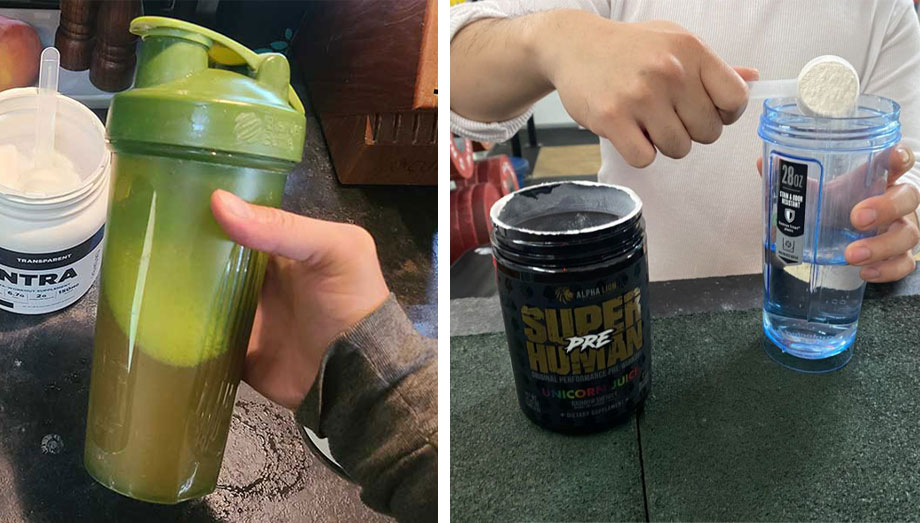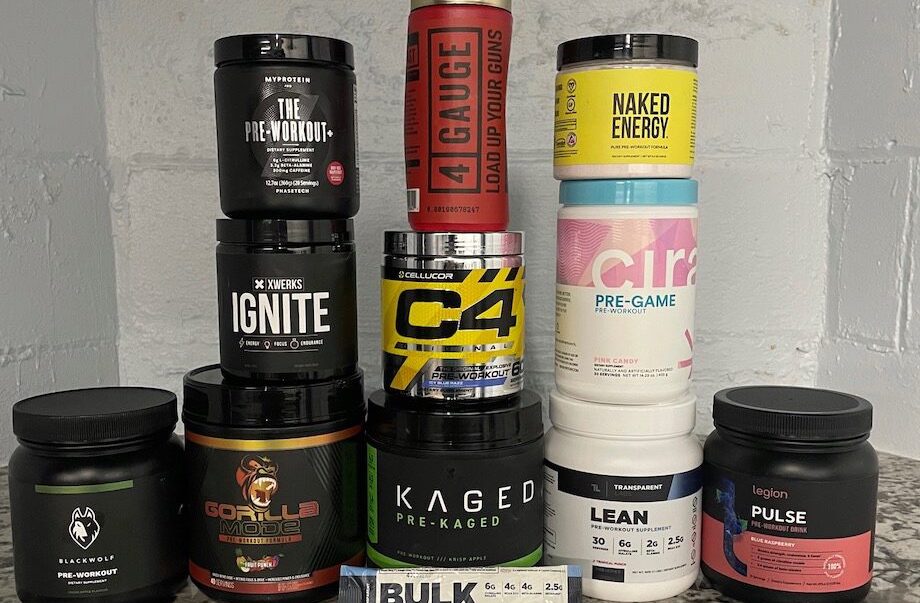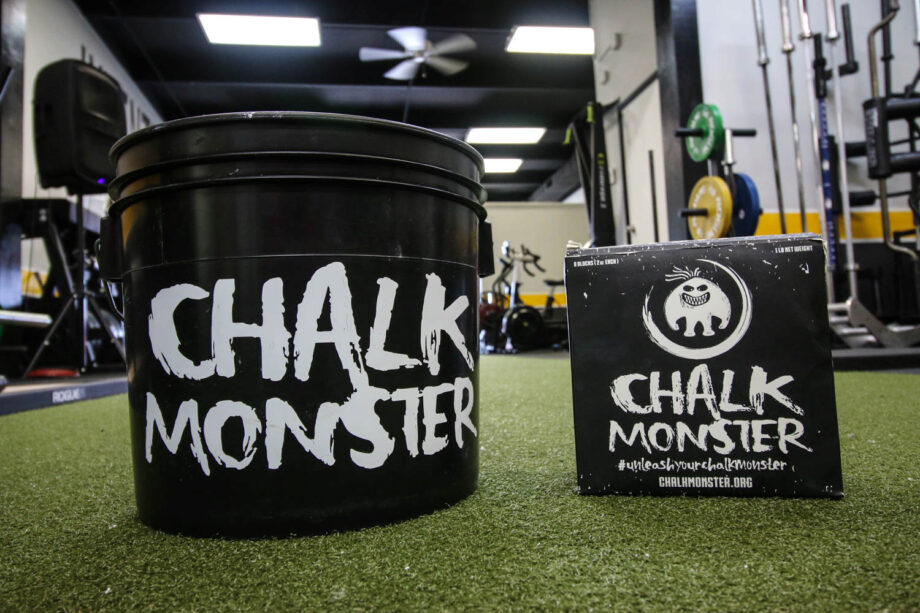The body can do some pretty incredible things when you provide it with all the necessary tools. A well-balanced diet, adequate sleep, proper hydration, and regular exercise go a long way toward supporting your overall health and fitness goals. But you can’t count out dietary supplements and their potential influence on athletic performance and health.
If you’re standing in the supplement aisle (or surfing the ‘net) wondering which products you actually need, you’re not alone! In the world of sports nutrition supplements, it’s easy to get overwhelmed. Branched-chain amino acids and pre-workout supplements, in particular, are often a source of confusion. What are they, what do they do, and do you need one or both?
RELATED: Pre-Workout vs Protein Powder
These are all great questions, and I’m here to help! I—a registered dietitian nutritionist (RDN)—will break down the science behind the BCAAs vs pre-workout debate so you can make an informed decision based on your needs. Let’s get into it.
Medical disclaimer: This article is intended for educational and informational purposes only. It is not intended as a substitute for medical advice. For health advice, contact a licensed healthcare provider.
What Are BCAAs?
Branched-chain amino acids (BCAAs) are three of nine essential amino acids (EAAs) that your body can’t produce by itself—leucine, isoleucine, and valine. BCAAs get their name from their chemical structure, which resembles tree branches. Interestingly, recent research shows1 that BCAAs bypass metabolism in the liver and head straight for the skeletal muscle, where they’re oxidized and put to work. Leucine especially plays an integral role in muscle protein synthesis—or the building of muscle through diet and exercise—leading researchers to explore the benefits of BCAAs in athletic training.
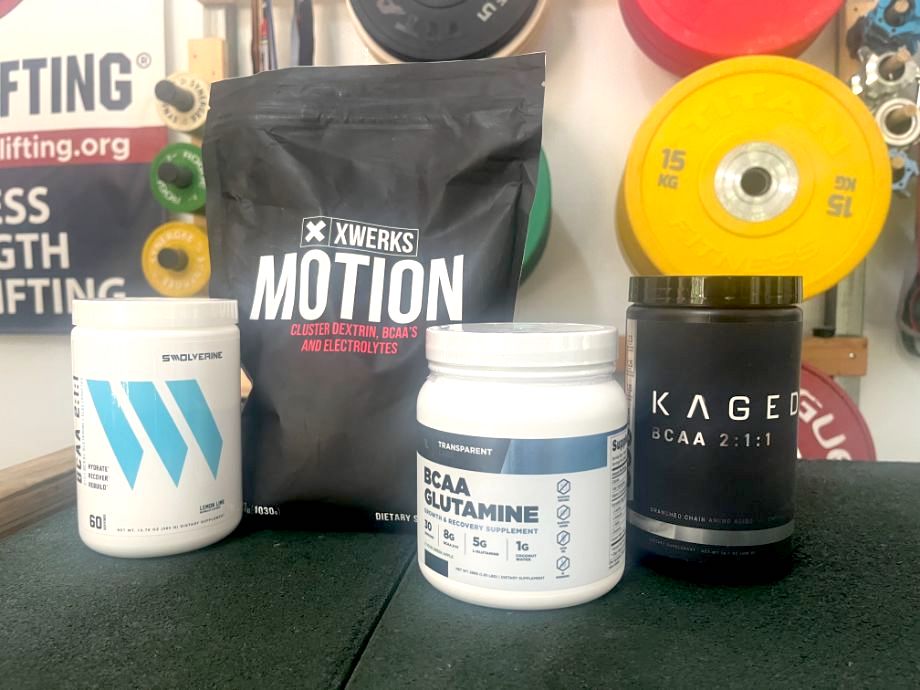
BCAA supplements get a lot of hype for their purported role in muscle recovery time. While more research is needed to understand the extent, scientific research shows2 that BCAA intake may help alleviate delayed-onset muscle soreness (DOMS) brought on by exercise-induced muscle damage.
Of course, soreness is subjective, so let’s look at it objectively. Some research has found3 that BCAA supplementation can result in lower levels of muscle damage markers like creatine kinase, lactate dehydrogenase, and myoglobin. So, it’s unsurprising that lifters who want to build muscle turn to BCAAs to help them speed up recovery time and reduce post-workout muscle breakdown between training sessions. But BCAAs aren’t just for bodybuilders looking for muscle growth. BCAAs can help reduce muscle loss in various settings, preserving lean muscle mass and optimizing strength.
RELATED: What Are BCAAs?
Still, not all research is conclusive. Studies indicate4 that orally ingested BCAAs may not be the only factor to consider in muscle protein synthesis. A registered dietitian nutritionist can help you decide if a BCAA supplement is warranted based on your average nutritional intake and physical demands.
What Is Pre-Workout?
Pre-workout supplements aim to keep you in the zone, mentally and physically, during high-intensity exercise. But how? No two pre-workouts are the same, but most contain ingredients like stimulants, creatine, beta-alanine, citrulline malate, and B vitamins that work together to boost energy levels and improve blood flow during training. Some high-quality pre-workouts even add BCAAs to their formula to increase the product’s impact.
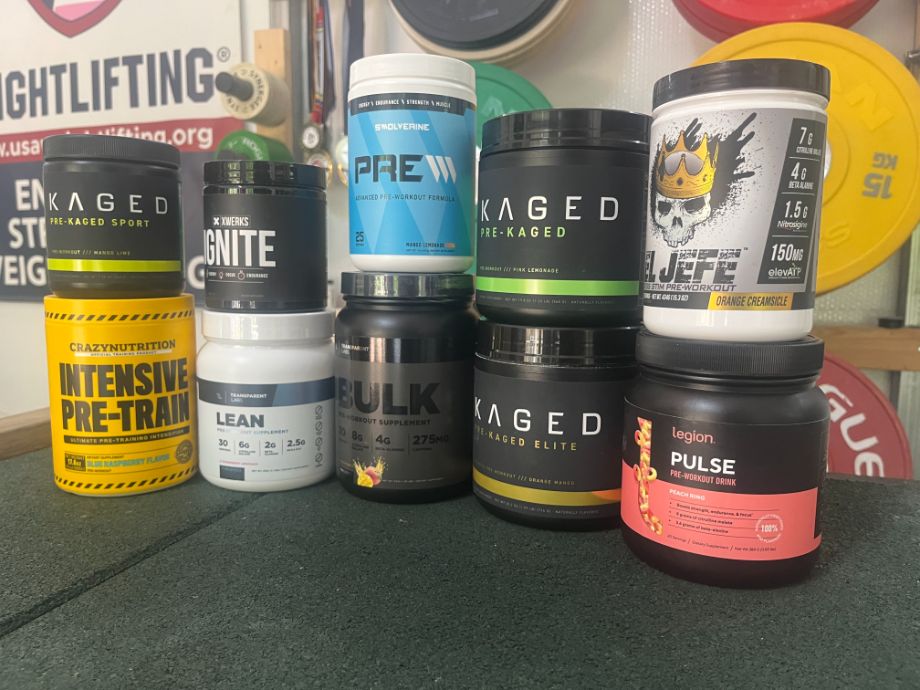
The goal of most pre-workout formulas is focus and reduced fatigue between reps. Still, unfortunately, even the best pre-workout products on the market can cause unwanted side effects if you’re sensitive to its ingredients. For example, if you’re sensitive to caffeine and other pre-workout stimulants, you might need to rely on good ol’ carbohydrates to fuel your muscles.
RELATED: Pre-Workout Side Effects
Key Similarities Between BCAAs and Pre-Workout
BCAAs and pre-workout supplements don’t share many similarities other than the intended purpose of influencing your energy levels. BCAAs aim to reduce fatigue between reps, promoting endurance in your training. Pre-workout supplements, on the other hand, target your energy output by stimulating your central nervous system with ingredients like caffeine or green tea extract.
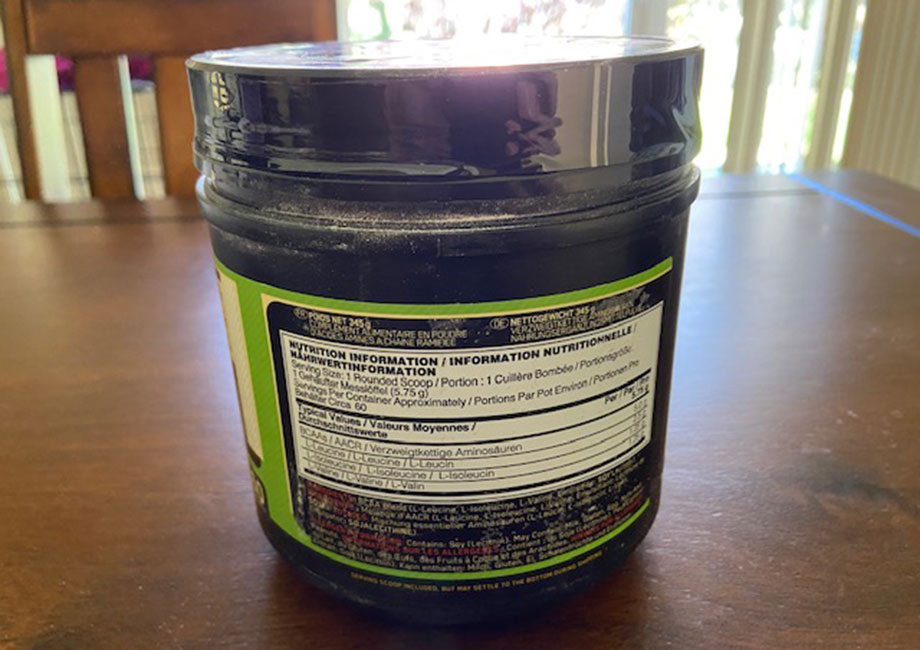
Other similarities between BCAAs and pre-workout include:
- Typically used in powdered form
- Can stack with other supplements
- Low-calorie
- Not regulated by the Federal Drug Administration (FDA)—this goes for all dietary supplements
Key Differences Between BCAAs and Pre-Workout
The primary difference between BCAAs and pre-workouts is their function. BCAAs contain ingredients to help promote recovery and reduce fatigue during workout sessions, while pre-workouts intend to help put a pep in your step and maximize your workout.

Still, there are a few notable differences, such as:
- Pre-workout supplements usually contain multiple ingredients, while many BCAAs only contain amino acids
- Pre-workouts often feature one stimulant (or several) to help boost your energy
- Pre-workouts may contain BCAAs, but BCAAs won’t contain pre-workout
RELATED: Best Pre-Workout With BCAAs
Side-By-Side Comparison
Comparing pre-workouts and BCAA supplements side-by-side is an interesting challenge because the possibilities are endless. There is no standardized recommended dose for either type of product—though, we highly suggest you follow the dosage on the label—so let’s compare a BCAA supplement with a pre-workout from the same company—here’s looking at you, Transparent Labs.
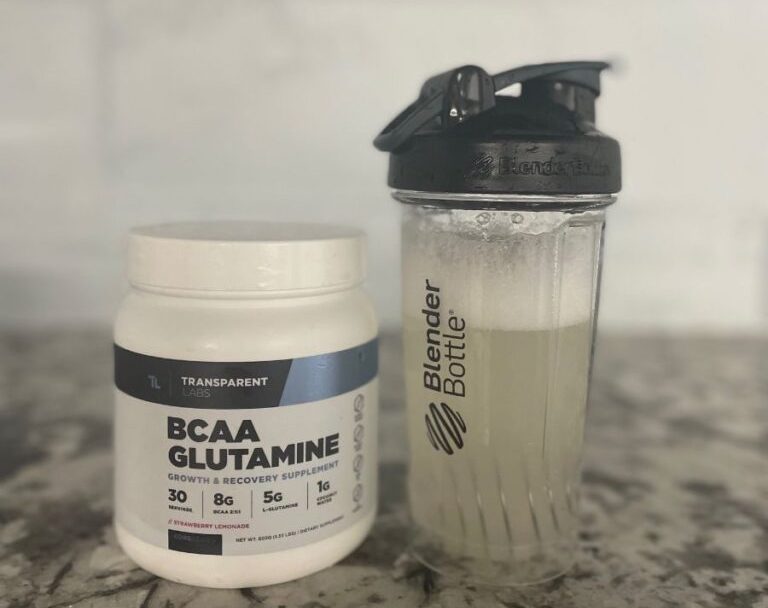
For this table, here’s a side-by-side look at BCAA Glutamine vs Transparent Labs Bulk Black. For more, check out our in-depth review of Transparent Labs BCAA Glutamine.
| BCAAs (Transparent Labs BCAA Glutamine) | Pre-Workout (Transparent Labs Bulk Black) | |
| Calories | 10 | 0 |
| Protein | 0 g | 0 g |
| Carbs | 2 g | 0 g |
| Fat | 0 g | 0 g |
| Fiber | 0 g | 0 g |
| Iron | 0 mg | 0 mg |
| Calcium | 0 mg | 0 mg |
| Caffeine | 0 mg | 275 mg |
You may have noticed there isn’t a lot to compare here. BCAAs vs pre-workout may come down to your caloric needs vs caffeine intake.
RELATED: Best Pre-Workout for Focus
Which Is Better For ….
There’s no right or wrong answer for choosing products for your supplement stack—it’s all about your personal goals and current lifestyle habits. However, deciding between a BCAA supplement and a pre-workout differs from finding a protein powder flavor you like. They can offer different benefits for the fitness-minded individual through their unique mechanisms.
RELATED: Best-Tasting Protein Powder
Consider your fitness goals and let the science help you make your decision.
Muscle Building and Muscle Gain
Science says amino acids are the building blocks for protein, and protein is the MVP of muscle tissue. So, if I had to choose BCAAs or pre-workouts for muscle gain, I’d pick BCAAs. Sure, the energy boost that most pre-workouts provide is excellent for maximizing your training sessions; however, branched-chain amino acids help increase muscle protein synthesis signaling.

Further, a 2017 study in the Journal of the International Society of Sports Nutrition4 states that leucine acts as a precursor for muscle protein synthesis, even playing a role in the intracellular signaling pathways necessary for protein synthesis. And, while the research surrounding isoleucine and valine isn’t as strong, the same study4 suggests that ingesting leucine alone can cause a decrease in the plasma concentrations of both valine and isoleucine, pointing to the importance of a BCAA supplement that contains all three. Research from 2020 even recommends5 a 2:1:1 ratio of leucine to isoleucine to valine in BCAA supplements to mitigate those concerns.
Weight Loss
Neither BCAAs or pre-workout supplements are magical weight loss solutions. Sustainable body weight management requires a holistic approach that involves eating a well-balanced diet, regular physical activity, and adequate sleep. However, both sports nutrition supplements offer benefits supporting your weight management efforts. Choosing the one that will help you the most depends on your lifestyle.
Do you need help with energy and focus at the gym to get the most out of your sweat sessions? A pre-workout might be your go-to. Do you need to mitigate muscle loss to preserve lean muscle tissue during weight loss? A BCAA supplement might bridge the gap in your diet.
RELATED: Best Pre-Workout For Weight Loss
Recovery
Proper recovery between training sessions is the key to maximizing health and fitness. It can’t just be go, go, go all the time. While there are things you can do to optimize muscle recovery between workouts, like getting enough sleep, refueling with nutrition, and rehydrating, some sports supplements can work behind the scenes and support your efforts.
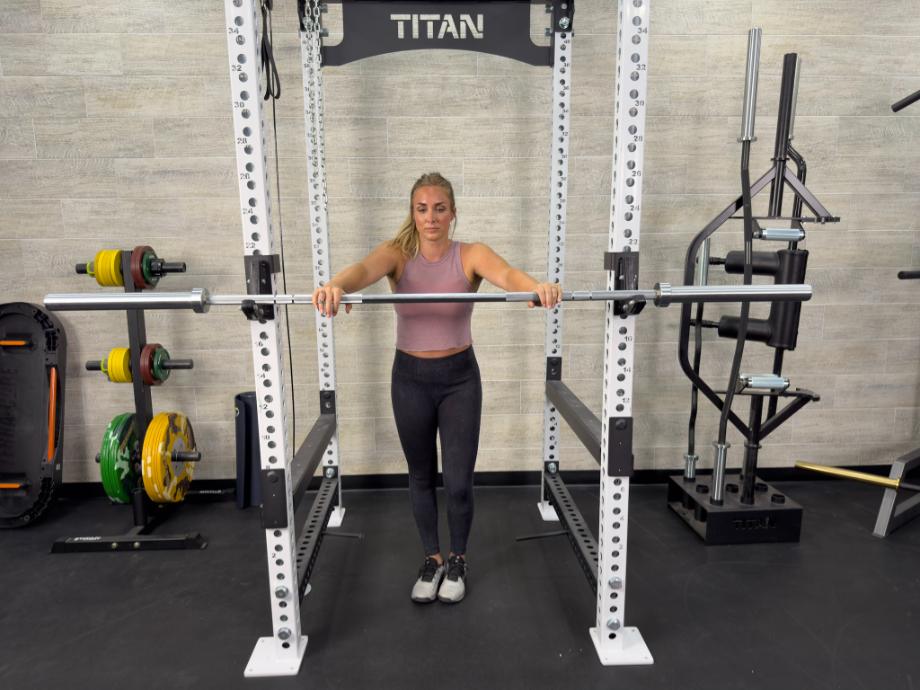
Pre-workouts typically contain ingredients to help increase your endurance during a workout, but don’t necessarily support post-workout muscle recovery. BCAA supplements, on the other hand, provide essential amino acids that the body can’t produce and need for various biological processes. So, if you need a muscle recovery supplement and your options are BCAAs or a pre-workout, BCAAs might be more worthwhile.
Who Should Use BCAAs?
BCAA supplements can be an excellent way to bridge the gap between your nutrient needs and nutritional intake, especially for those who want to pack on the muscle tissue. However, BCAAs aren’t just for weightlifters. Meeting your EAA needs can benefit runners, CrossFit athletes, pickleball pros—you name it!
Of course, BCAA supplementation isn’t a must-have. Consider your typical dietary intake and weigh the pros of adding more amino acids. A registered dietitian can help with that!
RELATED: Are BCAAs Worth It?
Who Should Use Pre-Workout?
Pre-workout supplements aren’t appropriate for everyone, especially those with caffeine sensitivity or a history of cardiac concerns. However, fitness-minded individuals who need a pep in their step before hitting the gym may benefit from taking a pre-workout. Be sure to read the nutrition labels to understand the caffeine content and note the other ingredients in the formulation.
RELATED: Is Pre-Workout Bad for Your Heart?
Of course, BCAA supplements and pre-workouts aren’t exclusive. Most people can take both and see their intended results. Still, the FDA doesn’t regulate dietary supplements, so it’s not a bad idea to seek guidance from a trusted professional.
BCAAs and Pre-Workout: FAQs
Which is better: BCAA or pre-workout?
There’s no straightforward answer. One is not necessarily better, but one may support your fitness effort more than the other. It truly depends on where you need support and what your fitness routine looks like
Do BCAAs give you energy before a workout?
BCAAs don’t necessarily give you energy, but they may help delay fatigue during a workout. Finding the right energy balance with your supplement routine takes trial and error.
RELATED: Do BCAAs Give You Energy?
Do BCAAs make a big difference?
Honestly, the research is mixed. Branched-chain amino acids can play a role in our overall health, and we have to get them from our diet because our bodies can’t produce them on their own. However, some research questions4 how much of an impact BCAA supplements have on athletic performance and post-workout recovery. I wouldn’t write them off just yet, but it’s worth keeping in mind if you want to streamline your budget.
These statements have not been evaluated by the Food and Drug Administration. This product is not intended to diagnose, treat, cure, or prevent any diseases.
References
- Martinho DV, Nobari H, Faria A, Field A, Duarte D, Sarmento H. Oral Branched-Chain Amino Acids Supplementation in Athletes: A Systematic Review. Nutrients. 2022;14(19):4002. Published 2022 Sep 27. doi:10.3390/nu14194002
- Weber MG, Dias SS, de Angelis TR, et al. The use of BCAA to decrease delayed-onset muscle soreness after a single bout of exercise: a systematic review and meta-analysis. Amino Acids. 2021;53(11):1663-1678. doi:10.1007/s00726-021-03089-2
- Doma K, Singh U, Boullosa D, Connor JD. The effect of branched-chain amino acid on muscle damage markers and performance following strenuous exercise: a systematic review and meta-analysis. Appl Physiol Nutr Metab. 2021;46(11):1303-1313. doi:10.1139/apnm-2021-0110
- Wolfe RR. Branched-chain amino acids and muscle protein synthesis in humans: myth or reality?. J Int Soc Sports Nutr. 2017;14:30. Published 2017 Aug 22. doi:10.1186/s12970-017-0184-9
- Mantuano P, Bianchini G, Cappellari O, et al. Ergogenic Effect of BCAAs and L-Alanine Supplementation: Proof-of-Concept Study in a Murine Model of Physiological Exercise. Nutrients. 2020;12(8):2295. Published 2020 Jul 30. doi:10.3390/nu12082295


